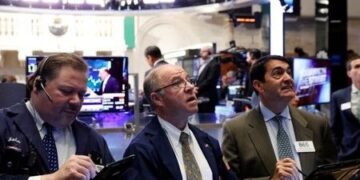Topline
President Donald Trump escalated his aggressive push for interest rate cuts Wednesday as the Federal Reserve held its meeting on the matter, and all evidence suggests it’s highly unlikely this week will produce the rate cuts the Oval Office desires, though it will reveal how the top U.S. monetary policymakers are approaching the U.S. economy as tariffs play out.
Federal Reserve Chair Jerome Powell will take center stage again this week.
Key Facts
In his latest attack on the Fed and its top-ranking official Jerome Powell, Trump derided Powell as a “stupid person” because he “probably won’t cut today.”
The name calling came just before the Fed says at 2 p.m. EDT Wednesday whether it decided to change interest rates, to be followed by Powell’s press conference.
The decision will follow Tuesday and Wednesday’s regularly scheduled meeting of the Federal Open Markets Committee, the 12-person committee that most crucially sets the target federal funds rate baseline for borrowing throughout the U.S. economy.
Wall Street considers it a near certainty the Fed will opt to keep rates at the 4.25% to 4.5% range they’ve stood since December.
Why Won’t The Fed Lower Rates?
Recent economic data seems to satisfy the normal rate cut preconditions of steady inflation and a weakening labor market, but the Fed has been hesitant to take action as it normally may, citing the uncertain impact of Trump’s tariffs. To that end, Goldman Sachs economists expect inflation to rise from its most recent 2.5% to 3.3% by December, according to the Fed’s preferred inflation measure of core personal consumption expenditures. Goldman expects the dot plot to also reveal the Fed expects to see higher unemployment (four-year high of 4.5%) and lower economic growth (1.3% real gross domestic product growth), though the investment bank does expect the Fed to stand by its projection of two 2025 cuts.
Fomc Meets With Fed Under White House Fire
Wednesday marked the latest in a long string of attacks on Powell. The monetary policy chief has been among the most frequent targets of Trump’s ire during the first five months of his second presidential term. Trump has repeatedly gone after the central banker as the Fed declines to cut rates to Trump’s liking. Trump called Powell a “numbskull” last week, and has frequently teased the possibility of firing Powell before his term expires next May.
What To Watch For
Beyond any potential fireworks from Powell amid the Trump barrage directed at him, the most critical update from this week’s Fed conclave will be the release of its quarterly summary of economic projections, or dot plot. That will reveal where Fed staff expect several key economic data points to head in the near future, notably indicating the median expectation for rate cuts from the policymakers who vote on conducting them. The March dot plot indicated the Fed’s baseline forecast was for two 25 basis-point cuts this year, but this month’s update will reveal just one expected cut in 2025, according to Bank of America forecasts.
How Will Stocks React To Fed Meeting?
Fed meetings often bring significant movements in stock prices, and the stakes are set this week for a potential move. Generally, stocks tend to rise when the Fed indicates rates will go lower and fall on the reverse, as public companies fetch higher valuations on stronger profit margins from lower borrowing costs and stocks becoming more attractive for investors as fixed income returns shrink. If the Fed adjusts its dot plot to indicate just one 2025 cut, that would cause a noticeable selloff in stocks, according to Sevens Report founder Tom Essaye, predicting a roughly 1% drop for the S&P 500 benchmark index. Should the Fed maintain its median forecast of two cuts, Essaye said he expects a mild rally, though that could expand into a sizable gain if Powell shows openness to lowering rates at the July meeting. The FedWatch Tool shows just a 13% chance of a cut at the July 29-30 summit.
Further Reading














